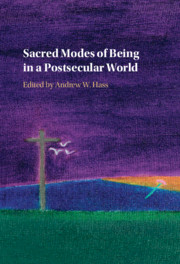Book contents
- Sacred Modes of Being in a Postsecular World
- Reviews
- Sacred Modes of Being in a Postsecular World
- Copyright page
- Contents
- Figures
- Contributors
- Acknowledgements
- Introduction
- Part I Jasper’s Sacred Mode of Being
- Part II Theology’s Cultural Mode of the Sacred
- Chapter 4 Theology as Literature, Rhetoric and Ideology
- Chapter 5 Hope in the Sacred Community
- Chapter 6 The Advent of the Nothing
- Part III Culture’s Theological Mode of the Sacred
- Bibliography
- Index
Chapter 6 - The Advent of the Nothing
from Part II - Theology’s Cultural Mode of the Sacred
Published online by Cambridge University Press: 07 September 2021
- Sacred Modes of Being in a Postsecular World
- Reviews
- Sacred Modes of Being in a Postsecular World
- Copyright page
- Contents
- Figures
- Contributors
- Acknowledgements
- Introduction
- Part I Jasper’s Sacred Mode of Being
- Part II Theology’s Cultural Mode of the Sacred
- Chapter 4 Theology as Literature, Rhetoric and Ideology
- Chapter 5 Hope in the Sacred Community
- Chapter 6 The Advent of the Nothing
- Part III Culture’s Theological Mode of the Sacred
- Bibliography
- Index
Summary
This chapter addresses the advent of Nothing within the history of religions as an advent necessarily within literature, and within the ritual enactments of literature as sacred. If the Commedia of Dante is our most profoundly heterodox work while at the same time our most purely orthodox, then Joyce is the late modern counterpart of Dante, and Finnegans Wake is not only the final epic of late modernity, but also at once deeply primordial and apocalyptic, so that its pure heterodoxy is nonetheless a profoundly liturgical work. Only the advent of a uniquely modern Nothing makes possible this universal liturgical celebration. This Nothing is more primal in the Wake than the liturgical movement of anamnesis, but this is an anamnesis of the fall, condemnation, and crucifixion of H.C.E. or Here Comes Everybody, repeated again and again, even as the host is ever broken in the mass. Thus the epic becomes our only purely liturgical epic, embodying a pure action that is a purely ritual action, one truly irresistible to all who actually encounter it as a liturgical mode of being, which is our most sacred mode.
- Type
- Chapter
- Information
- Sacred Modes of Being in a Postsecular World , pp. 122 - 134Publisher: Cambridge University PressPrint publication year: 2021

